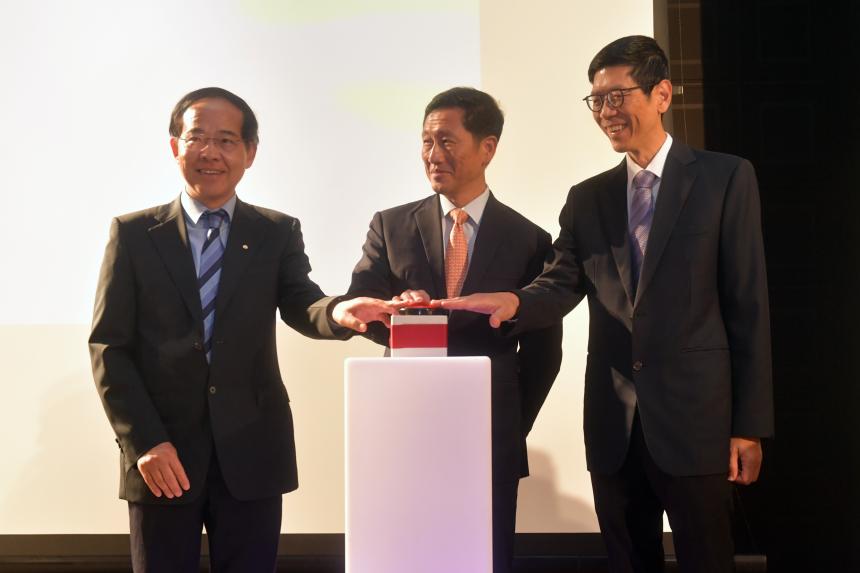SINGAPORE - Scientists and researchers played critical roles not just in treating patients amid the Covid-19 outbreak but also in determining policies.
Speaking at the launch of the Programme for Research in Epidemic Preparedness and Response (Prepare), which will pull together pandemic experts from various fields to respond to future infectious disease outbreaks, Minister of Health Ong Ye Kung reflected on the role of research and science.
“Our years of investment in biomedical research, and our cumulation of experts across diverse fields, have paid off during the Covid-19 pandemic crisis. Without that reservoir of capabilities and talent that was built up over the years, we would not have been able to respond to the pandemic as effectively as we have,” he said.
He added that the Covid-19 experience has enhanced Singapore’s preparedness against future disease outbreaks, with Prepare being one of the spearheads of future initiatives.
At the event on Thursday, Mr Ong lauded the achievements of a number of scientists, including Professor Wang Linfa from Duke-NUS Medical School. The world-renowned coronavirus expert and his team managed to isolate the Sars-CoV-2 virus within days of the first Covid-19 case.
Mr Ong said Prof Wang, who leads Prepare, laid the foundation for subsequent Covid-19 research, and provided important insights to help the Ministry of Health (MOH) formulate and adjust policies throughout the pandemic.
He also led a team of scientists from the National Centre for Infectious Diseases (NCID), Agency for Science, Technology and Research (A*Star) and global biotech company GenScript to develop the first Sars-CoV-2 serology test, cPass. This portable test is easily able to test for antibodies, indicating the presence of the virus, without the need for special containment facilities.
The other scientists named are:
Dr Sidney Yee, from the Diagnostics Development Hub; Dr Masafumi Inoue, from the Experimental Drug Development Centre at A*Star; Dr Sebastian Maurer-Stroh from A*Star’s Bioinformatics Institute, Dr Timothy Barkham from Tan Tock Seng Hospital, and Ms Wong Woei Jiuang and Dr Rama Sethuraman from the Health Sciences Authority
They invented one of the world’s first Covid-19 diagnostics tests, Fortitude Kit, on Feb 7, 2020, developing it within three weeks of the publication of the Sars-CoV-2 genomic sequence. To date, more than seven million Fortitude Kits have been produced, and shipped to over 45 countries worldwide.
Professor Lim Keng Hui, Professor Loh Xian Jun, Dr Kang Chang Wei and Dr Ivan Tan from A*Star
They used modelling techniques to understand flight trajectories of droplets spread. Their work aided public sector agencies and event providers in adopting effective safe management measures in public locations and on public transport.
Associate Professor Barnaby Young from NCID and Professor Lisa Ng from A*Star
Their study analysing Covid-19 viral load levels showed that a few days after showing symptoms, the viral load dropped to relatively low levels, and the virus was no longer able to replicate.
This finding was critical, said Mr Ong.
“It enabled us to move away from the practice of discharging Covid-19 patients upon a negative test result, which can take many days or weeks, to a policy of discharging a patient after a maximum of seven days,” he said.
Professor Alex Cook from the Saw Swee Hock School of Public Health
The expert in infectious disease modelling worked with MOH throughout the pandemic to provide projections of Covid-19 disease trajectory. His work was critical in the determination of the adequacy of Singapore’s healthcare capacity, and whether safe management measures needed to be tightened or relaxed.
Researchers from the National Covid-19 Research Workgroup
They were key in formulating the definition of vaccination, Mr Ong said. The researchers studied the development of immunity in the local population following infections or vaccinations.
From local and international research data, they discovered that vaccination continues to provide strong protection against severe disease 10 to 12 months after three shots of mRNA vaccines.
The updated definition of vaccination states that individuals need to take an additional shot five to 12 months after their last shot to attain minimum protection.
Professor David Lye from NCID
He actively engaged the United States’ National Institutes of Health to include Singapore as a global Covid-19 clinical trials site.
This allowed the Republic to have early access to therapeutic drugs such as remdesivir.
Prof Lye was also a member of Singapore’s Covid-19 Therapeutics and Vaccines Expert Group, which engaged vaccine manufacturers, and recommended promising vaccines for early acquisition by the Republic.
Correction note: An earlier version of this story incorrectly designated Associate Professor Barnaby Young from NCID as Professor Barnaby Young. We are sorry for the error.

